Leadership and Management Report: Unilever's Operations Analysis
VerifiedAdded on 2023/01/10
|14
|5161
|50
Report
AI Summary
This report provides a comprehensive analysis of leadership and management principles, using Unilever as a case study. It begins by differentiating between the roles and characteristics of leaders and managers, outlining their respective responsibilities and key attributes. The report then examines the practical application of these roles within an organizational context, considering various scenarios and challenges. It explores the application of leadership theories and models, specifically focusing on Situational Leadership, Systems Leadership, and Contingency Leadership, with a justification for the preferred approach. The report further evaluates the strengths and weaknesses of these models. Additionally, it covers key approaches to operations management and their value, and evaluates how operational management can improve efficiency. Finally, it examines the impact of business environment factors on operations management. The report concludes with a critical evaluation of the application of operations management and the factors that influence the business environment.
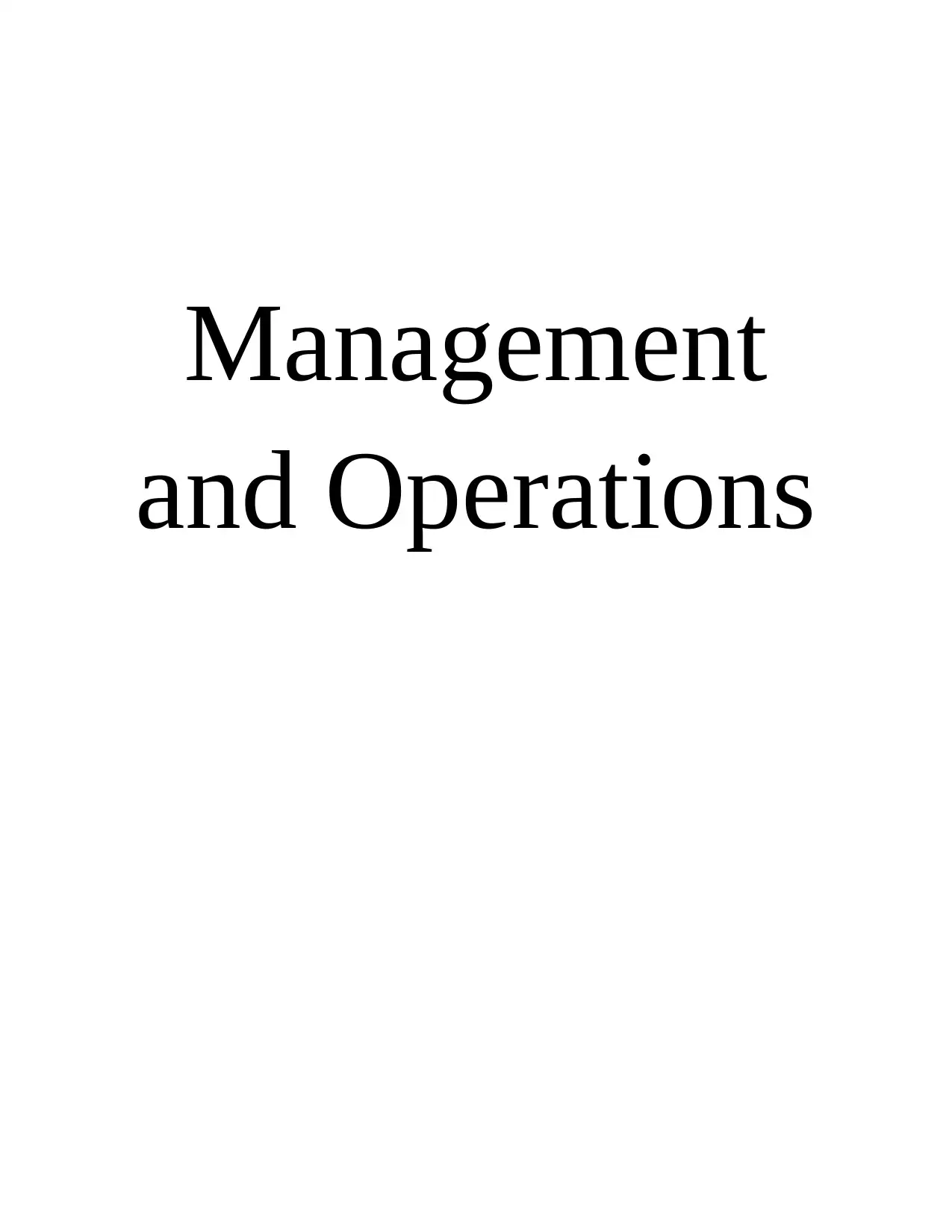
Management
and Operations
and Operations
Paraphrase This Document
Need a fresh take? Get an instant paraphrase of this document with our AI Paraphraser
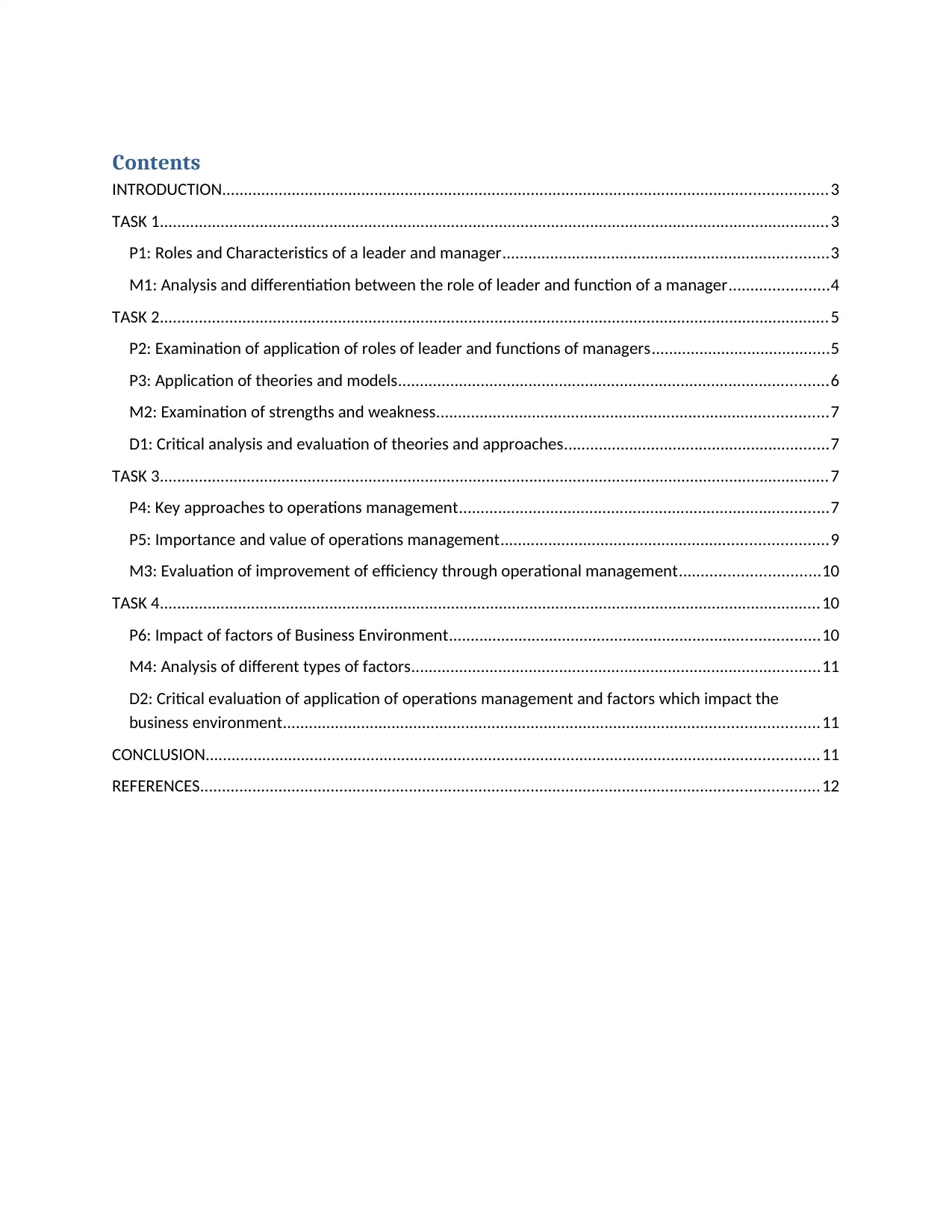
Contents
INTRODUCTION...........................................................................................................................................3
TASK 1..........................................................................................................................................................3
P1: Roles and Characteristics of a leader and manager...........................................................................3
M1: Analysis and differentiation between the role of leader and function of a manager.......................4
TASK 2..........................................................................................................................................................5
P2: Examination of application of roles of leader and functions of managers.........................................5
P3: Application of theories and models...................................................................................................6
M2: Examination of strengths and weakness..........................................................................................7
D1: Critical analysis and evaluation of theories and approaches.............................................................7
TASK 3..........................................................................................................................................................7
P4: Key approaches to operations management.....................................................................................7
P5: Importance and value of operations management...........................................................................9
M3: Evaluation of improvement of efficiency through operational management................................10
TASK 4........................................................................................................................................................10
P6: Impact of factors of Business Environment.....................................................................................10
M4: Analysis of different types of factors..............................................................................................11
D2: Critical evaluation of application of operations management and factors which impact the
business environment...........................................................................................................................11
CONCLUSION.............................................................................................................................................11
REFERENCES..............................................................................................................................................12
INTRODUCTION...........................................................................................................................................3
TASK 1..........................................................................................................................................................3
P1: Roles and Characteristics of a leader and manager...........................................................................3
M1: Analysis and differentiation between the role of leader and function of a manager.......................4
TASK 2..........................................................................................................................................................5
P2: Examination of application of roles of leader and functions of managers.........................................5
P3: Application of theories and models...................................................................................................6
M2: Examination of strengths and weakness..........................................................................................7
D1: Critical analysis and evaluation of theories and approaches.............................................................7
TASK 3..........................................................................................................................................................7
P4: Key approaches to operations management.....................................................................................7
P5: Importance and value of operations management...........................................................................9
M3: Evaluation of improvement of efficiency through operational management................................10
TASK 4........................................................................................................................................................10
P6: Impact of factors of Business Environment.....................................................................................10
M4: Analysis of different types of factors..............................................................................................11
D2: Critical evaluation of application of operations management and factors which impact the
business environment...........................................................................................................................11
CONCLUSION.............................................................................................................................................11
REFERENCES..............................................................................................................................................12
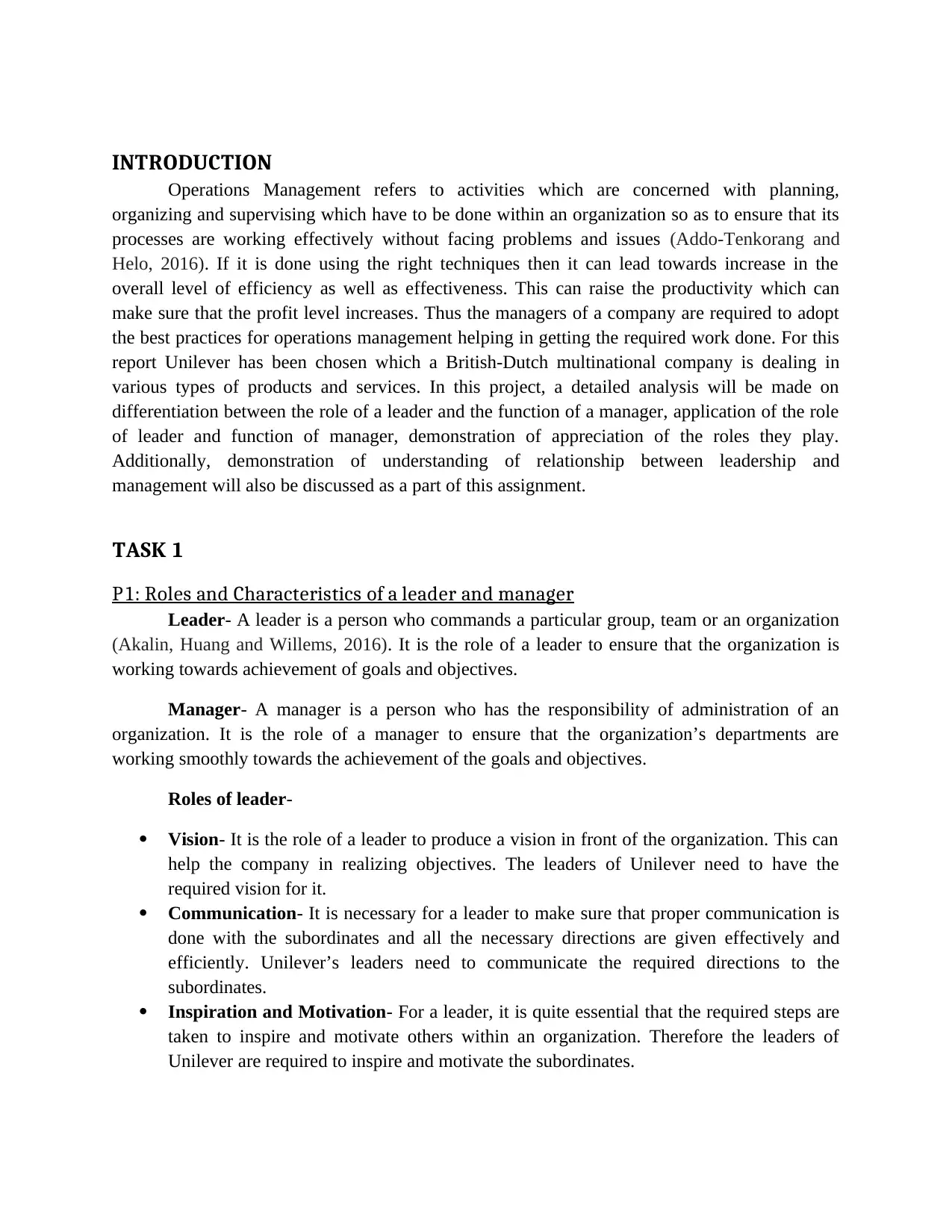
INTRODUCTION
Operations Management refers to activities which are concerned with planning,
organizing and supervising which have to be done within an organization so as to ensure that its
processes are working effectively without facing problems and issues (Addo-Tenkorang and
Helo, 2016). If it is done using the right techniques then it can lead towards increase in the
overall level of efficiency as well as effectiveness. This can raise the productivity which can
make sure that the profit level increases. Thus the managers of a company are required to adopt
the best practices for operations management helping in getting the required work done. For this
report Unilever has been chosen which a British-Dutch multinational company is dealing in
various types of products and services. In this project, a detailed analysis will be made on
differentiation between the role of a leader and the function of a manager, application of the role
of leader and function of manager, demonstration of appreciation of the roles they play.
Additionally, demonstration of understanding of relationship between leadership and
management will also be discussed as a part of this assignment.
TASK 1
P1: Roles and Characteristics of a leader and manager
Leader- A leader is a person who commands a particular group, team or an organization
(Akalin, Huang and Willems, 2016). It is the role of a leader to ensure that the organization is
working towards achievement of goals and objectives.
Manager- A manager is a person who has the responsibility of administration of an
organization. It is the role of a manager to ensure that the organization’s departments are
working smoothly towards the achievement of the goals and objectives.
Roles of leader-
Vision- It is the role of a leader to produce a vision in front of the organization. This can
help the company in realizing objectives. The leaders of Unilever need to have the
required vision for it.
Communication- It is necessary for a leader to make sure that proper communication is
done with the subordinates and all the necessary directions are given effectively and
efficiently. Unilever’s leaders need to communicate the required directions to the
subordinates.
Inspiration and Motivation- For a leader, it is quite essential that the required steps are
taken to inspire and motivate others within an organization. Therefore the leaders of
Unilever are required to inspire and motivate the subordinates.
Operations Management refers to activities which are concerned with planning,
organizing and supervising which have to be done within an organization so as to ensure that its
processes are working effectively without facing problems and issues (Addo-Tenkorang and
Helo, 2016). If it is done using the right techniques then it can lead towards increase in the
overall level of efficiency as well as effectiveness. This can raise the productivity which can
make sure that the profit level increases. Thus the managers of a company are required to adopt
the best practices for operations management helping in getting the required work done. For this
report Unilever has been chosen which a British-Dutch multinational company is dealing in
various types of products and services. In this project, a detailed analysis will be made on
differentiation between the role of a leader and the function of a manager, application of the role
of leader and function of manager, demonstration of appreciation of the roles they play.
Additionally, demonstration of understanding of relationship between leadership and
management will also be discussed as a part of this assignment.
TASK 1
P1: Roles and Characteristics of a leader and manager
Leader- A leader is a person who commands a particular group, team or an organization
(Akalin, Huang and Willems, 2016). It is the role of a leader to ensure that the organization is
working towards achievement of goals and objectives.
Manager- A manager is a person who has the responsibility of administration of an
organization. It is the role of a manager to ensure that the organization’s departments are
working smoothly towards the achievement of the goals and objectives.
Roles of leader-
Vision- It is the role of a leader to produce a vision in front of the organization. This can
help the company in realizing objectives. The leaders of Unilever need to have the
required vision for it.
Communication- It is necessary for a leader to make sure that proper communication is
done with the subordinates and all the necessary directions are given effectively and
efficiently. Unilever’s leaders need to communicate the required directions to the
subordinates.
Inspiration and Motivation- For a leader, it is quite essential that the required steps are
taken to inspire and motivate others within an organization. Therefore the leaders of
Unilever are required to inspire and motivate the subordinates.
⊘ This is a preview!⊘
Do you want full access?
Subscribe today to unlock all pages.

Trusted by 1+ million students worldwide
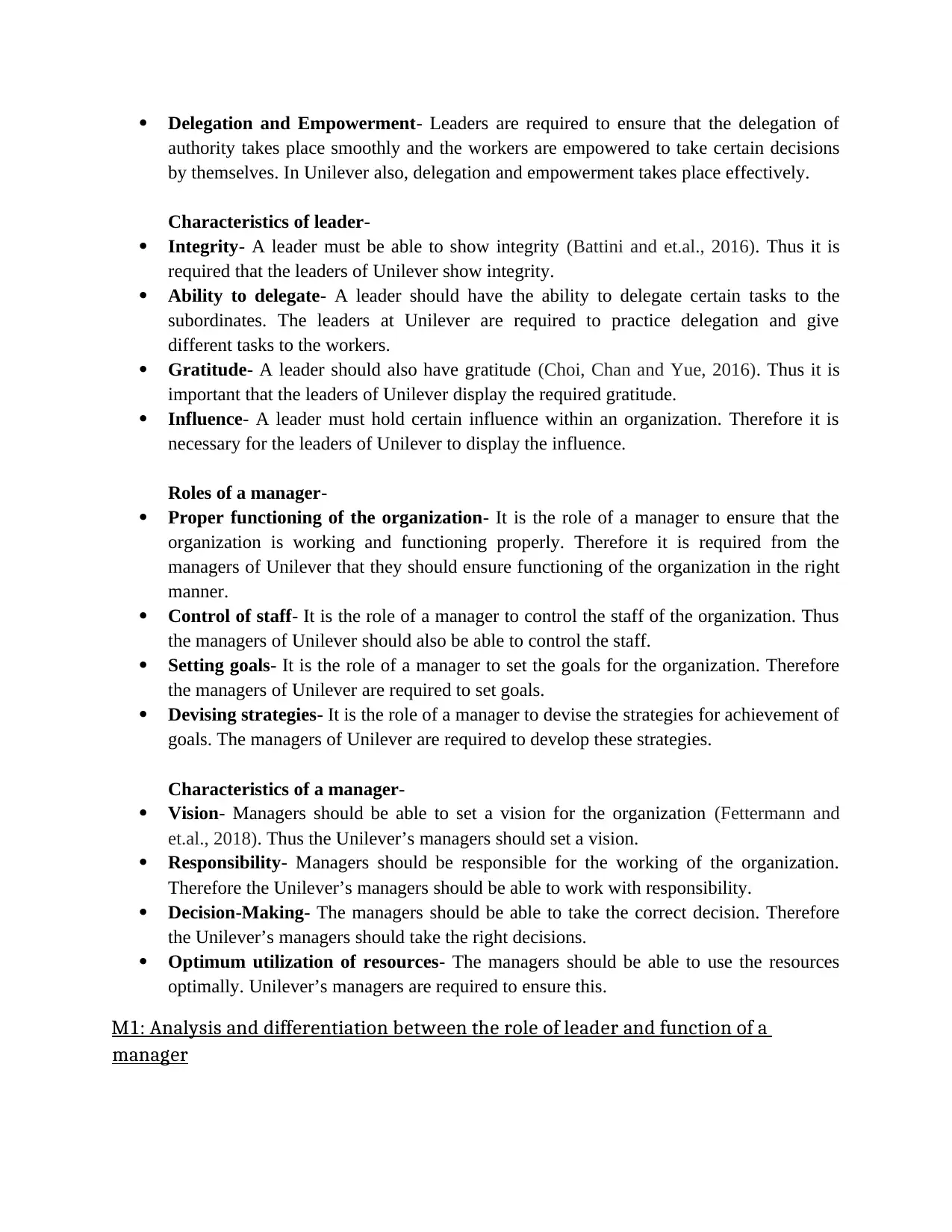
Delegation and Empowerment- Leaders are required to ensure that the delegation of
authority takes place smoothly and the workers are empowered to take certain decisions
by themselves. In Unilever also, delegation and empowerment takes place effectively.
Characteristics of leader-
Integrity- A leader must be able to show integrity (Battini and et.al., 2016). Thus it is
required that the leaders of Unilever show integrity.
Ability to delegate- A leader should have the ability to delegate certain tasks to the
subordinates. The leaders at Unilever are required to practice delegation and give
different tasks to the workers.
Gratitude- A leader should also have gratitude (Choi, Chan and Yue, 2016). Thus it is
important that the leaders of Unilever display the required gratitude.
Influence- A leader must hold certain influence within an organization. Therefore it is
necessary for the leaders of Unilever to display the influence.
Roles of a manager-
Proper functioning of the organization- It is the role of a manager to ensure that the
organization is working and functioning properly. Therefore it is required from the
managers of Unilever that they should ensure functioning of the organization in the right
manner.
Control of staff- It is the role of a manager to control the staff of the organization. Thus
the managers of Unilever should also be able to control the staff.
Setting goals- It is the role of a manager to set the goals for the organization. Therefore
the managers of Unilever are required to set goals.
Devising strategies- It is the role of a manager to devise the strategies for achievement of
goals. The managers of Unilever are required to develop these strategies.
Characteristics of a manager-
Vision- Managers should be able to set a vision for the organization (Fettermann and
et.al., 2018). Thus the Unilever’s managers should set a vision.
Responsibility- Managers should be responsible for the working of the organization.
Therefore the Unilever’s managers should be able to work with responsibility.
Decision-Making- The managers should be able to take the correct decision. Therefore
the Unilever’s managers should take the right decisions.
Optimum utilization of resources- The managers should be able to use the resources
optimally. Unilever’s managers are required to ensure this.
M1: Analysis and differentiation between the role of leader and function of a
manager
authority takes place smoothly and the workers are empowered to take certain decisions
by themselves. In Unilever also, delegation and empowerment takes place effectively.
Characteristics of leader-
Integrity- A leader must be able to show integrity (Battini and et.al., 2016). Thus it is
required that the leaders of Unilever show integrity.
Ability to delegate- A leader should have the ability to delegate certain tasks to the
subordinates. The leaders at Unilever are required to practice delegation and give
different tasks to the workers.
Gratitude- A leader should also have gratitude (Choi, Chan and Yue, 2016). Thus it is
important that the leaders of Unilever display the required gratitude.
Influence- A leader must hold certain influence within an organization. Therefore it is
necessary for the leaders of Unilever to display the influence.
Roles of a manager-
Proper functioning of the organization- It is the role of a manager to ensure that the
organization is working and functioning properly. Therefore it is required from the
managers of Unilever that they should ensure functioning of the organization in the right
manner.
Control of staff- It is the role of a manager to control the staff of the organization. Thus
the managers of Unilever should also be able to control the staff.
Setting goals- It is the role of a manager to set the goals for the organization. Therefore
the managers of Unilever are required to set goals.
Devising strategies- It is the role of a manager to devise the strategies for achievement of
goals. The managers of Unilever are required to develop these strategies.
Characteristics of a manager-
Vision- Managers should be able to set a vision for the organization (Fettermann and
et.al., 2018). Thus the Unilever’s managers should set a vision.
Responsibility- Managers should be responsible for the working of the organization.
Therefore the Unilever’s managers should be able to work with responsibility.
Decision-Making- The managers should be able to take the correct decision. Therefore
the Unilever’s managers should take the right decisions.
Optimum utilization of resources- The managers should be able to use the resources
optimally. Unilever’s managers are required to ensure this.
M1: Analysis and differentiation between the role of leader and function of a
manager
Paraphrase This Document
Need a fresh take? Get an instant paraphrase of this document with our AI Paraphraser
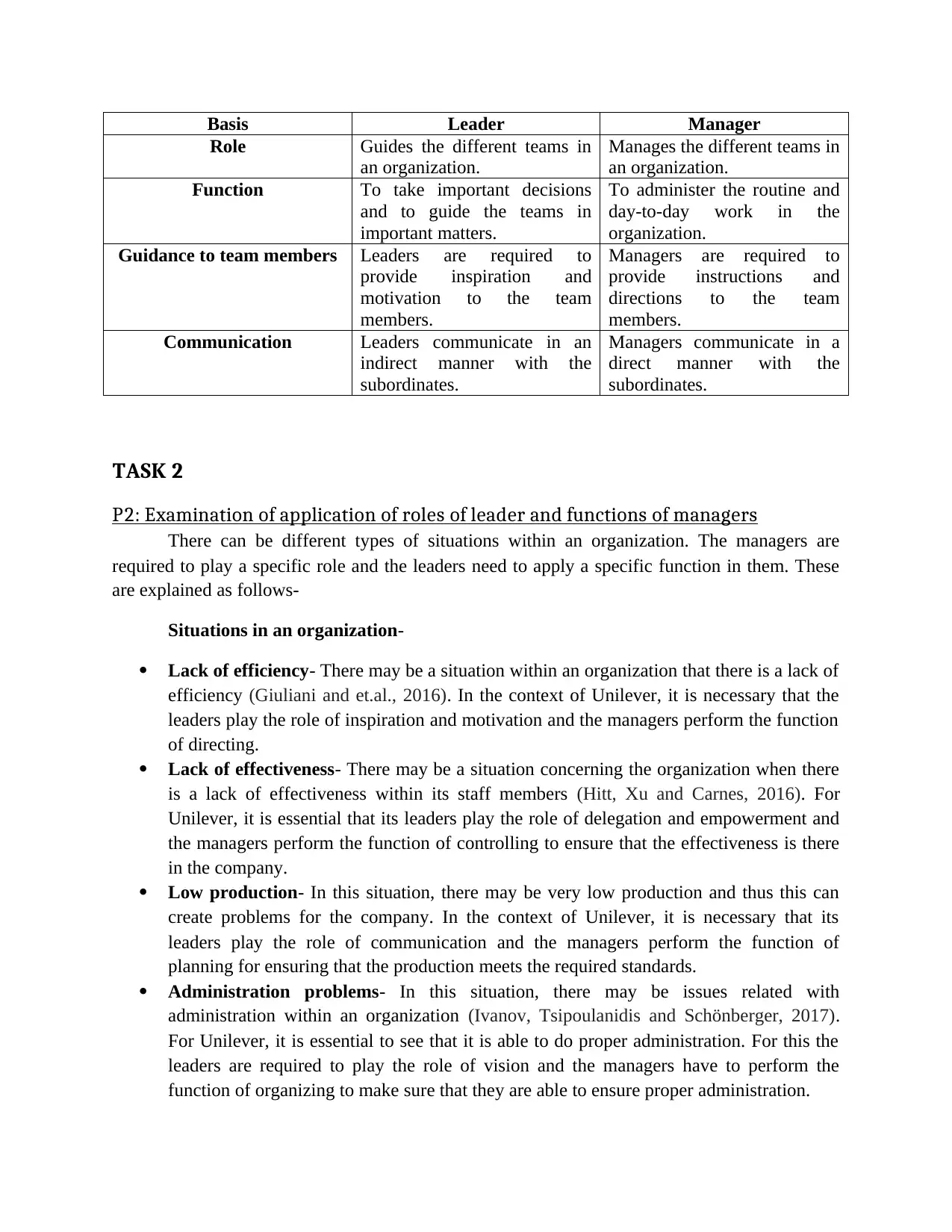
Basis Leader Manager
Role Guides the different teams in
an organization.
Manages the different teams in
an organization.
Function To take important decisions
and to guide the teams in
important matters.
To administer the routine and
day-to-day work in the
organization.
Guidance to team members Leaders are required to
provide inspiration and
motivation to the team
members.
Managers are required to
provide instructions and
directions to the team
members.
Communication Leaders communicate in an
indirect manner with the
subordinates.
Managers communicate in a
direct manner with the
subordinates.
TASK 2
P2: Examination of application of roles of leader and functions of managers
There can be different types of situations within an organization. The managers are
required to play a specific role and the leaders need to apply a specific function in them. These
are explained as follows-
Situations in an organization-
Lack of efficiency- There may be a situation within an organization that there is a lack of
efficiency (Giuliani and et.al., 2016). In the context of Unilever, it is necessary that the
leaders play the role of inspiration and motivation and the managers perform the function
of directing.
Lack of effectiveness- There may be a situation concerning the organization when there
is a lack of effectiveness within its staff members (Hitt, Xu and Carnes, 2016). For
Unilever, it is essential that its leaders play the role of delegation and empowerment and
the managers perform the function of controlling to ensure that the effectiveness is there
in the company.
Low production- In this situation, there may be very low production and thus this can
create problems for the company. In the context of Unilever, it is necessary that its
leaders play the role of communication and the managers perform the function of
planning for ensuring that the production meets the required standards.
Administration problems- In this situation, there may be issues related with
administration within an organization (Ivanov, Tsipoulanidis and Schönberger, 2017).
For Unilever, it is essential to see that it is able to do proper administration. For this the
leaders are required to play the role of vision and the managers have to perform the
function of organizing to make sure that they are able to ensure proper administration.
Role Guides the different teams in
an organization.
Manages the different teams in
an organization.
Function To take important decisions
and to guide the teams in
important matters.
To administer the routine and
day-to-day work in the
organization.
Guidance to team members Leaders are required to
provide inspiration and
motivation to the team
members.
Managers are required to
provide instructions and
directions to the team
members.
Communication Leaders communicate in an
indirect manner with the
subordinates.
Managers communicate in a
direct manner with the
subordinates.
TASK 2
P2: Examination of application of roles of leader and functions of managers
There can be different types of situations within an organization. The managers are
required to play a specific role and the leaders need to apply a specific function in them. These
are explained as follows-
Situations in an organization-
Lack of efficiency- There may be a situation within an organization that there is a lack of
efficiency (Giuliani and et.al., 2016). In the context of Unilever, it is necessary that the
leaders play the role of inspiration and motivation and the managers perform the function
of directing.
Lack of effectiveness- There may be a situation concerning the organization when there
is a lack of effectiveness within its staff members (Hitt, Xu and Carnes, 2016). For
Unilever, it is essential that its leaders play the role of delegation and empowerment and
the managers perform the function of controlling to ensure that the effectiveness is there
in the company.
Low production- In this situation, there may be very low production and thus this can
create problems for the company. In the context of Unilever, it is necessary that its
leaders play the role of communication and the managers perform the function of
planning for ensuring that the production meets the required standards.
Administration problems- In this situation, there may be issues related with
administration within an organization (Ivanov, Tsipoulanidis and Schönberger, 2017).
For Unilever, it is essential to see that it is able to do proper administration. For this the
leaders are required to play the role of vision and the managers have to perform the
function of organizing to make sure that they are able to ensure proper administration.
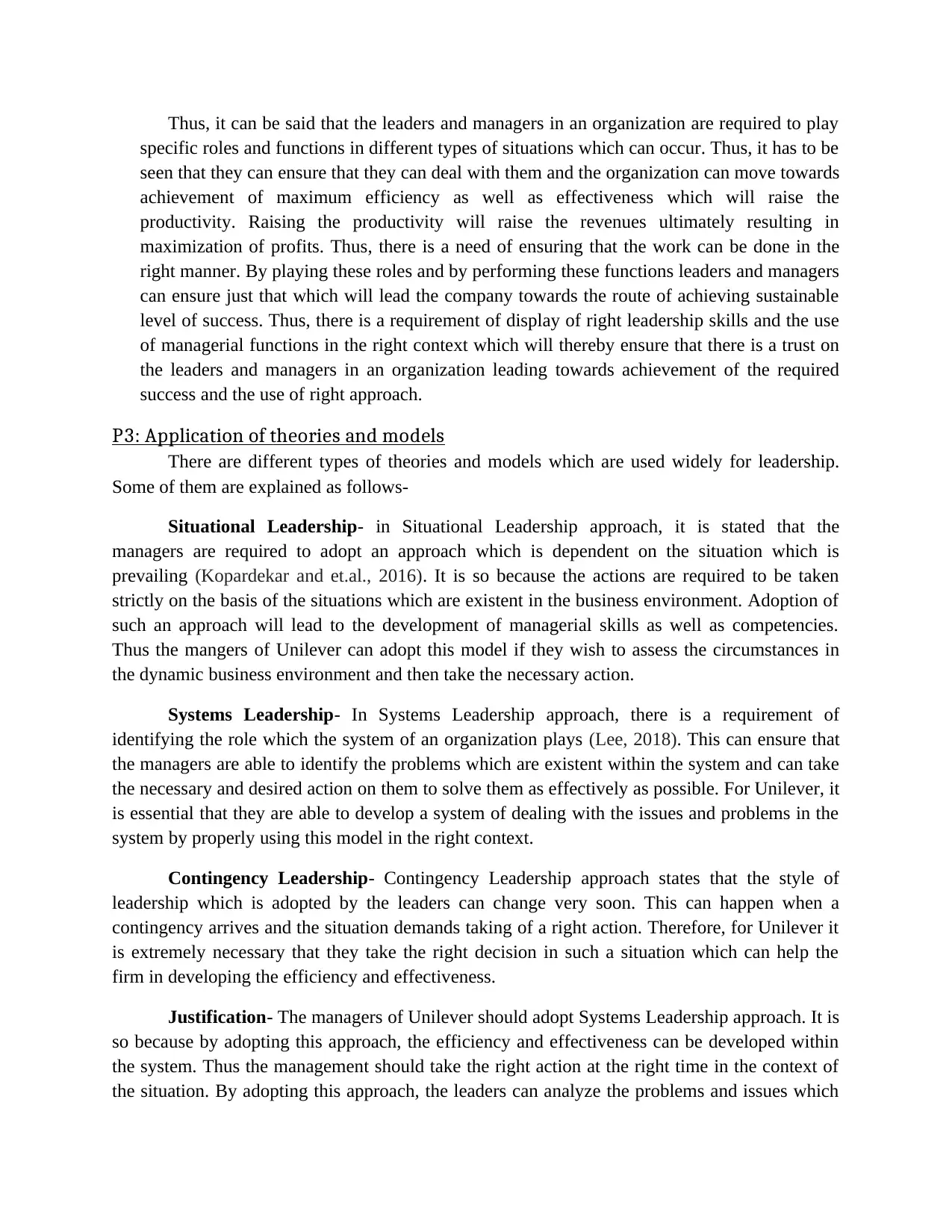
Thus, it can be said that the leaders and managers in an organization are required to play
specific roles and functions in different types of situations which can occur. Thus, it has to be
seen that they can ensure that they can deal with them and the organization can move towards
achievement of maximum efficiency as well as effectiveness which will raise the
productivity. Raising the productivity will raise the revenues ultimately resulting in
maximization of profits. Thus, there is a need of ensuring that the work can be done in the
right manner. By playing these roles and by performing these functions leaders and managers
can ensure just that which will lead the company towards the route of achieving sustainable
level of success. Thus, there is a requirement of display of right leadership skills and the use
of managerial functions in the right context which will thereby ensure that there is a trust on
the leaders and managers in an organization leading towards achievement of the required
success and the use of right approach.
P3: Application of theories and models
There are different types of theories and models which are used widely for leadership.
Some of them are explained as follows-
Situational Leadership- in Situational Leadership approach, it is stated that the
managers are required to adopt an approach which is dependent on the situation which is
prevailing (Kopardekar and et.al., 2016). It is so because the actions are required to be taken
strictly on the basis of the situations which are existent in the business environment. Adoption of
such an approach will lead to the development of managerial skills as well as competencies.
Thus the mangers of Unilever can adopt this model if they wish to assess the circumstances in
the dynamic business environment and then take the necessary action.
Systems Leadership- In Systems Leadership approach, there is a requirement of
identifying the role which the system of an organization plays (Lee, 2018). This can ensure that
the managers are able to identify the problems which are existent within the system and can take
the necessary and desired action on them to solve them as effectively as possible. For Unilever, it
is essential that they are able to develop a system of dealing with the issues and problems in the
system by properly using this model in the right context.
Contingency Leadership- Contingency Leadership approach states that the style of
leadership which is adopted by the leaders can change very soon. This can happen when a
contingency arrives and the situation demands taking of a right action. Therefore, for Unilever it
is extremely necessary that they take the right decision in such a situation which can help the
firm in developing the efficiency and effectiveness.
Justification- The managers of Unilever should adopt Systems Leadership approach. It is
so because by adopting this approach, the efficiency and effectiveness can be developed within
the system. Thus the management should take the right action at the right time in the context of
the situation. By adopting this approach, the leaders can analyze the problems and issues which
specific roles and functions in different types of situations which can occur. Thus, it has to be
seen that they can ensure that they can deal with them and the organization can move towards
achievement of maximum efficiency as well as effectiveness which will raise the
productivity. Raising the productivity will raise the revenues ultimately resulting in
maximization of profits. Thus, there is a need of ensuring that the work can be done in the
right manner. By playing these roles and by performing these functions leaders and managers
can ensure just that which will lead the company towards the route of achieving sustainable
level of success. Thus, there is a requirement of display of right leadership skills and the use
of managerial functions in the right context which will thereby ensure that there is a trust on
the leaders and managers in an organization leading towards achievement of the required
success and the use of right approach.
P3: Application of theories and models
There are different types of theories and models which are used widely for leadership.
Some of them are explained as follows-
Situational Leadership- in Situational Leadership approach, it is stated that the
managers are required to adopt an approach which is dependent on the situation which is
prevailing (Kopardekar and et.al., 2016). It is so because the actions are required to be taken
strictly on the basis of the situations which are existent in the business environment. Adoption of
such an approach will lead to the development of managerial skills as well as competencies.
Thus the mangers of Unilever can adopt this model if they wish to assess the circumstances in
the dynamic business environment and then take the necessary action.
Systems Leadership- In Systems Leadership approach, there is a requirement of
identifying the role which the system of an organization plays (Lee, 2018). This can ensure that
the managers are able to identify the problems which are existent within the system and can take
the necessary and desired action on them to solve them as effectively as possible. For Unilever, it
is essential that they are able to develop a system of dealing with the issues and problems in the
system by properly using this model in the right context.
Contingency Leadership- Contingency Leadership approach states that the style of
leadership which is adopted by the leaders can change very soon. This can happen when a
contingency arrives and the situation demands taking of a right action. Therefore, for Unilever it
is extremely necessary that they take the right decision in such a situation which can help the
firm in developing the efficiency and effectiveness.
Justification- The managers of Unilever should adopt Systems Leadership approach. It is
so because by adopting this approach, the efficiency and effectiveness can be developed within
the system. Thus the management should take the right action at the right time in the context of
the situation. By adopting this approach, the leaders can analyze the problems and issues which
⊘ This is a preview!⊘
Do you want full access?
Subscribe today to unlock all pages.

Trusted by 1+ million students worldwide
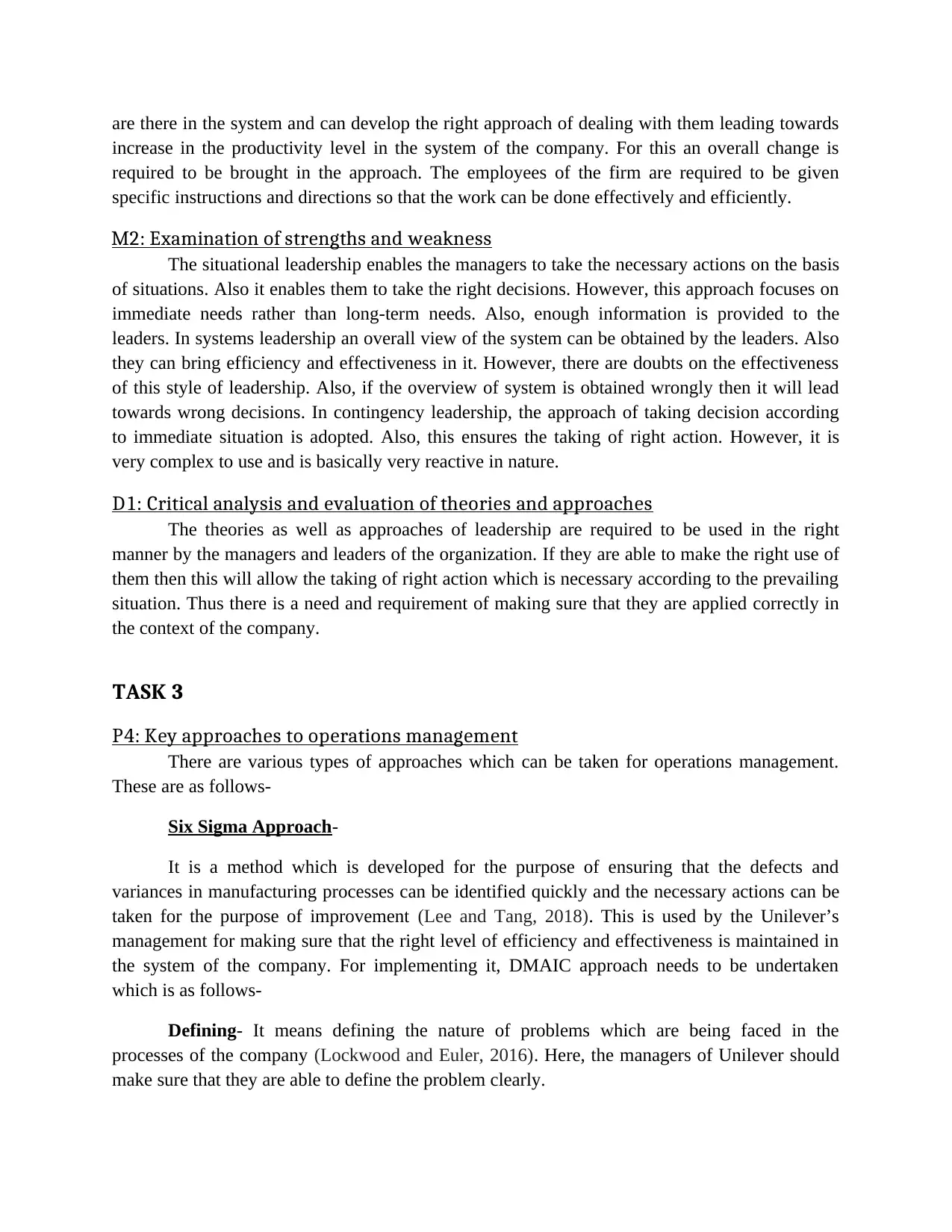
are there in the system and can develop the right approach of dealing with them leading towards
increase in the productivity level in the system of the company. For this an overall change is
required to be brought in the approach. The employees of the firm are required to be given
specific instructions and directions so that the work can be done effectively and efficiently.
M2: Examination of strengths and weakness
The situational leadership enables the managers to take the necessary actions on the basis
of situations. Also it enables them to take the right decisions. However, this approach focuses on
immediate needs rather than long-term needs. Also, enough information is provided to the
leaders. In systems leadership an overall view of the system can be obtained by the leaders. Also
they can bring efficiency and effectiveness in it. However, there are doubts on the effectiveness
of this style of leadership. Also, if the overview of system is obtained wrongly then it will lead
towards wrong decisions. In contingency leadership, the approach of taking decision according
to immediate situation is adopted. Also, this ensures the taking of right action. However, it is
very complex to use and is basically very reactive in nature.
D1: Critical analysis and evaluation of theories and approaches
The theories as well as approaches of leadership are required to be used in the right
manner by the managers and leaders of the organization. If they are able to make the right use of
them then this will allow the taking of right action which is necessary according to the prevailing
situation. Thus there is a need and requirement of making sure that they are applied correctly in
the context of the company.
TASK 3
P4: Key approaches to operations management
There are various types of approaches which can be taken for operations management.
These are as follows-
Six Sigma Approach-
It is a method which is developed for the purpose of ensuring that the defects and
variances in manufacturing processes can be identified quickly and the necessary actions can be
taken for the purpose of improvement (Lee and Tang, 2018). This is used by the Unilever’s
management for making sure that the right level of efficiency and effectiveness is maintained in
the system of the company. For implementing it, DMAIC approach needs to be undertaken
which is as follows-
Defining- It means defining the nature of problems which are being faced in the
processes of the company (Lockwood and Euler, 2016). Here, the managers of Unilever should
make sure that they are able to define the problem clearly.
increase in the productivity level in the system of the company. For this an overall change is
required to be brought in the approach. The employees of the firm are required to be given
specific instructions and directions so that the work can be done effectively and efficiently.
M2: Examination of strengths and weakness
The situational leadership enables the managers to take the necessary actions on the basis
of situations. Also it enables them to take the right decisions. However, this approach focuses on
immediate needs rather than long-term needs. Also, enough information is provided to the
leaders. In systems leadership an overall view of the system can be obtained by the leaders. Also
they can bring efficiency and effectiveness in it. However, there are doubts on the effectiveness
of this style of leadership. Also, if the overview of system is obtained wrongly then it will lead
towards wrong decisions. In contingency leadership, the approach of taking decision according
to immediate situation is adopted. Also, this ensures the taking of right action. However, it is
very complex to use and is basically very reactive in nature.
D1: Critical analysis and evaluation of theories and approaches
The theories as well as approaches of leadership are required to be used in the right
manner by the managers and leaders of the organization. If they are able to make the right use of
them then this will allow the taking of right action which is necessary according to the prevailing
situation. Thus there is a need and requirement of making sure that they are applied correctly in
the context of the company.
TASK 3
P4: Key approaches to operations management
There are various types of approaches which can be taken for operations management.
These are as follows-
Six Sigma Approach-
It is a method which is developed for the purpose of ensuring that the defects and
variances in manufacturing processes can be identified quickly and the necessary actions can be
taken for the purpose of improvement (Lee and Tang, 2018). This is used by the Unilever’s
management for making sure that the right level of efficiency and effectiveness is maintained in
the system of the company. For implementing it, DMAIC approach needs to be undertaken
which is as follows-
Defining- It means defining the nature of problems which are being faced in the
processes of the company (Lockwood and Euler, 2016). Here, the managers of Unilever should
make sure that they are able to define the problem clearly.
Paraphrase This Document
Need a fresh take? Get an instant paraphrase of this document with our AI Paraphraser
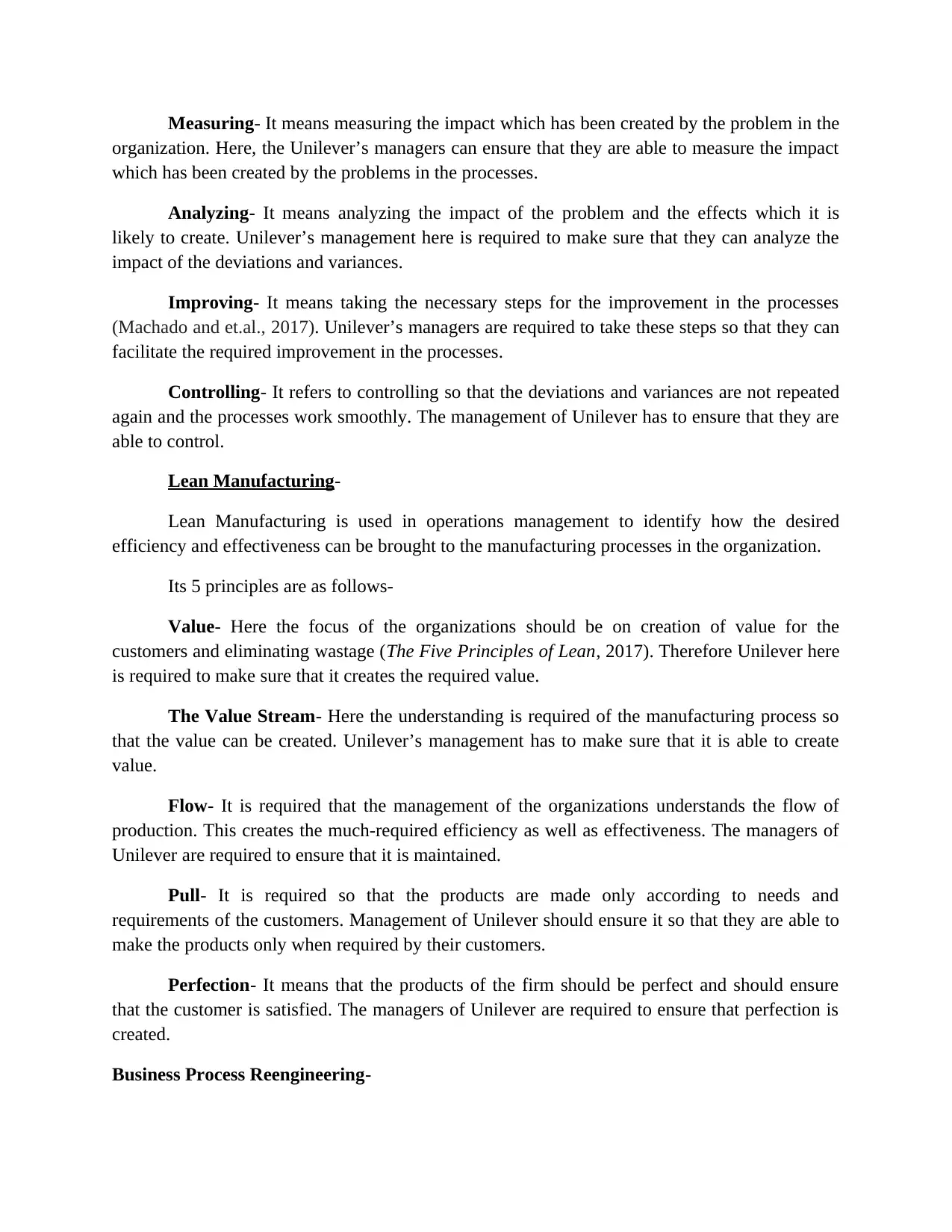
Measuring- It means measuring the impact which has been created by the problem in the
organization. Here, the Unilever’s managers can ensure that they are able to measure the impact
which has been created by the problems in the processes.
Analyzing- It means analyzing the impact of the problem and the effects which it is
likely to create. Unilever’s management here is required to make sure that they can analyze the
impact of the deviations and variances.
Improving- It means taking the necessary steps for the improvement in the processes
(Machado and et.al., 2017). Unilever’s managers are required to take these steps so that they can
facilitate the required improvement in the processes.
Controlling- It refers to controlling so that the deviations and variances are not repeated
again and the processes work smoothly. The management of Unilever has to ensure that they are
able to control.
Lean Manufacturing-
Lean Manufacturing is used in operations management to identify how the desired
efficiency and effectiveness can be brought to the manufacturing processes in the organization.
Its 5 principles are as follows-
Value- Here the focus of the organizations should be on creation of value for the
customers and eliminating wastage (The Five Principles of Lean, 2017). Therefore Unilever here
is required to make sure that it creates the required value.
The Value Stream- Here the understanding is required of the manufacturing process so
that the value can be created. Unilever’s management has to make sure that it is able to create
value.
Flow- It is required that the management of the organizations understands the flow of
production. This creates the much-required efficiency as well as effectiveness. The managers of
Unilever are required to ensure that it is maintained.
Pull- It is required so that the products are made only according to needs and
requirements of the customers. Management of Unilever should ensure it so that they are able to
make the products only when required by their customers.
Perfection- It means that the products of the firm should be perfect and should ensure
that the customer is satisfied. The managers of Unilever are required to ensure that perfection is
created.
Business Process Reengineering-
organization. Here, the Unilever’s managers can ensure that they are able to measure the impact
which has been created by the problems in the processes.
Analyzing- It means analyzing the impact of the problem and the effects which it is
likely to create. Unilever’s management here is required to make sure that they can analyze the
impact of the deviations and variances.
Improving- It means taking the necessary steps for the improvement in the processes
(Machado and et.al., 2017). Unilever’s managers are required to take these steps so that they can
facilitate the required improvement in the processes.
Controlling- It refers to controlling so that the deviations and variances are not repeated
again and the processes work smoothly. The management of Unilever has to ensure that they are
able to control.
Lean Manufacturing-
Lean Manufacturing is used in operations management to identify how the desired
efficiency and effectiveness can be brought to the manufacturing processes in the organization.
Its 5 principles are as follows-
Value- Here the focus of the organizations should be on creation of value for the
customers and eliminating wastage (The Five Principles of Lean, 2017). Therefore Unilever here
is required to make sure that it creates the required value.
The Value Stream- Here the understanding is required of the manufacturing process so
that the value can be created. Unilever’s management has to make sure that it is able to create
value.
Flow- It is required that the management of the organizations understands the flow of
production. This creates the much-required efficiency as well as effectiveness. The managers of
Unilever are required to ensure that it is maintained.
Pull- It is required so that the products are made only according to needs and
requirements of the customers. Management of Unilever should ensure it so that they are able to
make the products only when required by their customers.
Perfection- It means that the products of the firm should be perfect and should ensure
that the customer is satisfied. The managers of Unilever are required to ensure that perfection is
created.
Business Process Reengineering-
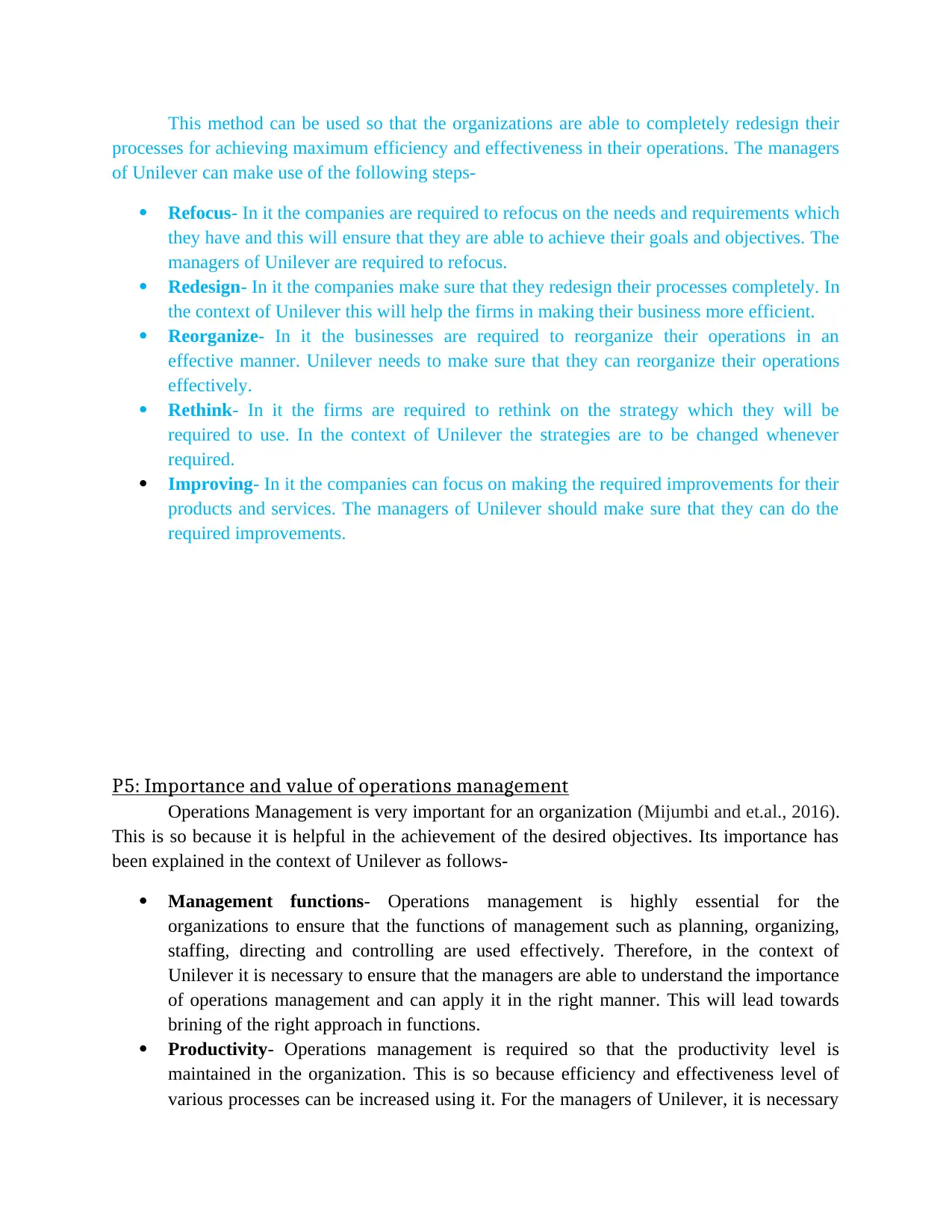
This method can be used so that the organizations are able to completely redesign their
processes for achieving maximum efficiency and effectiveness in their operations. The managers
of Unilever can make use of the following steps-
Refocus- In it the companies are required to refocus on the needs and requirements which
they have and this will ensure that they are able to achieve their goals and objectives. The
managers of Unilever are required to refocus.
Redesign- In it the companies make sure that they redesign their processes completely. In
the context of Unilever this will help the firms in making their business more efficient.
Reorganize- In it the businesses are required to reorganize their operations in an
effective manner. Unilever needs to make sure that they can reorganize their operations
effectively.
Rethink- In it the firms are required to rethink on the strategy which they will be
required to use. In the context of Unilever the strategies are to be changed whenever
required.
Improving- In it the companies can focus on making the required improvements for their
products and services. The managers of Unilever should make sure that they can do the
required improvements.
P5: Importance and value of operations management
Operations Management is very important for an organization (Mijumbi and et.al., 2016).
This is so because it is helpful in the achievement of the desired objectives. Its importance has
been explained in the context of Unilever as follows-
Management functions- Operations management is highly essential for the
organizations to ensure that the functions of management such as planning, organizing,
staffing, directing and controlling are used effectively. Therefore, in the context of
Unilever it is necessary to ensure that the managers are able to understand the importance
of operations management and can apply it in the right manner. This will lead towards
brining of the right approach in functions.
Productivity- Operations management is required so that the productivity level is
maintained in the organization. This is so because efficiency and effectiveness level of
various processes can be increased using it. For the managers of Unilever, it is necessary
processes for achieving maximum efficiency and effectiveness in their operations. The managers
of Unilever can make use of the following steps-
Refocus- In it the companies are required to refocus on the needs and requirements which
they have and this will ensure that they are able to achieve their goals and objectives. The
managers of Unilever are required to refocus.
Redesign- In it the companies make sure that they redesign their processes completely. In
the context of Unilever this will help the firms in making their business more efficient.
Reorganize- In it the businesses are required to reorganize their operations in an
effective manner. Unilever needs to make sure that they can reorganize their operations
effectively.
Rethink- In it the firms are required to rethink on the strategy which they will be
required to use. In the context of Unilever the strategies are to be changed whenever
required.
Improving- In it the companies can focus on making the required improvements for their
products and services. The managers of Unilever should make sure that they can do the
required improvements.
P5: Importance and value of operations management
Operations Management is very important for an organization (Mijumbi and et.al., 2016).
This is so because it is helpful in the achievement of the desired objectives. Its importance has
been explained in the context of Unilever as follows-
Management functions- Operations management is highly essential for the
organizations to ensure that the functions of management such as planning, organizing,
staffing, directing and controlling are used effectively. Therefore, in the context of
Unilever it is necessary to ensure that the managers are able to understand the importance
of operations management and can apply it in the right manner. This will lead towards
brining of the right approach in functions.
Productivity- Operations management is required so that the productivity level is
maintained in the organization. This is so because efficiency and effectiveness level of
various processes can be increased using it. For the managers of Unilever, it is necessary
⊘ This is a preview!⊘
Do you want full access?
Subscribe today to unlock all pages.

Trusted by 1+ million students worldwide
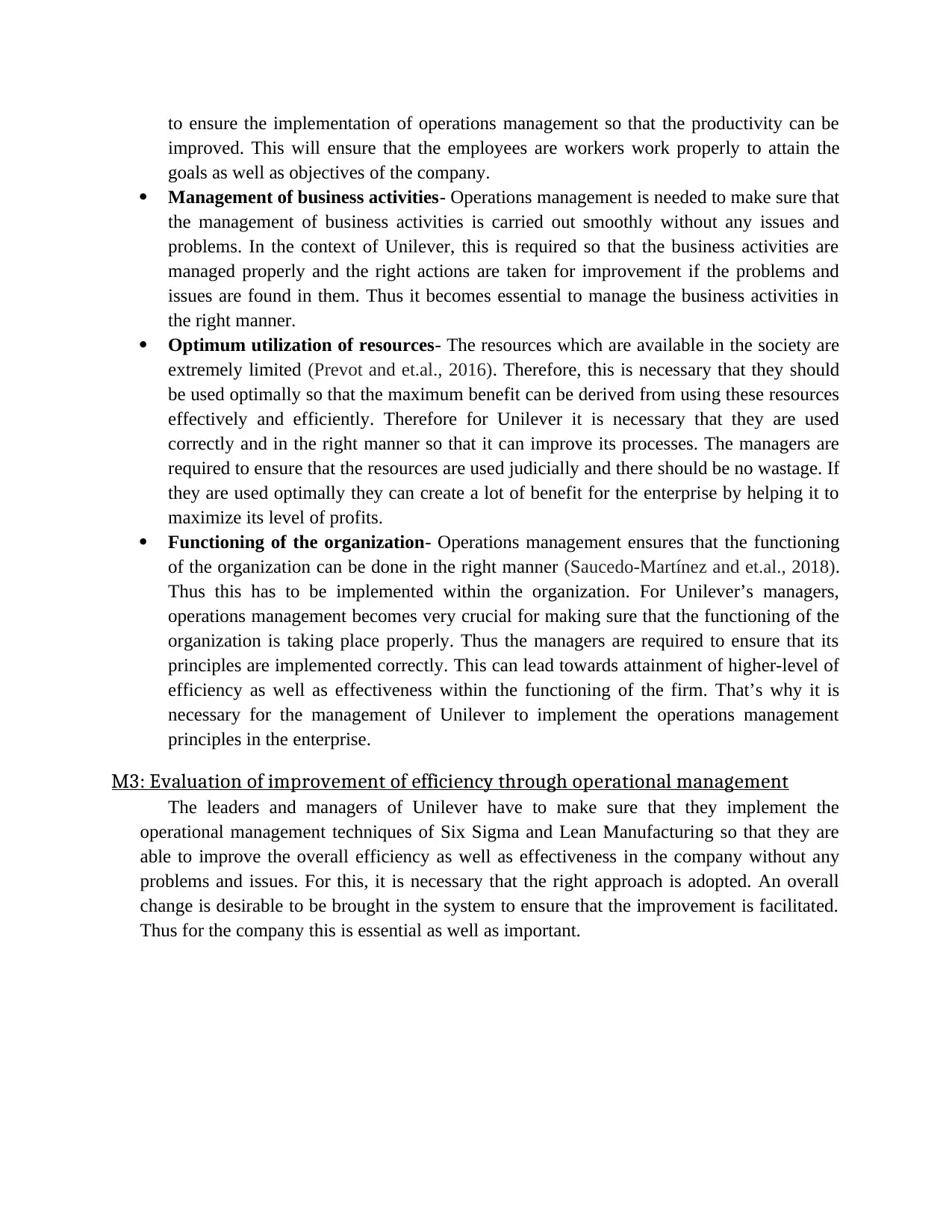
to ensure the implementation of operations management so that the productivity can be
improved. This will ensure that the employees are workers work properly to attain the
goals as well as objectives of the company.
Management of business activities- Operations management is needed to make sure that
the management of business activities is carried out smoothly without any issues and
problems. In the context of Unilever, this is required so that the business activities are
managed properly and the right actions are taken for improvement if the problems and
issues are found in them. Thus it becomes essential to manage the business activities in
the right manner.
Optimum utilization of resources- The resources which are available in the society are
extremely limited (Prevot and et.al., 2016). Therefore, this is necessary that they should
be used optimally so that the maximum benefit can be derived from using these resources
effectively and efficiently. Therefore for Unilever it is necessary that they are used
correctly and in the right manner so that it can improve its processes. The managers are
required to ensure that the resources are used judicially and there should be no wastage. If
they are used optimally they can create a lot of benefit for the enterprise by helping it to
maximize its level of profits.
Functioning of the organization- Operations management ensures that the functioning
of the organization can be done in the right manner (Saucedo-Martínez and et.al., 2018).
Thus this has to be implemented within the organization. For Unilever’s managers,
operations management becomes very crucial for making sure that the functioning of the
organization is taking place properly. Thus the managers are required to ensure that its
principles are implemented correctly. This can lead towards attainment of higher-level of
efficiency as well as effectiveness within the functioning of the firm. That’s why it is
necessary for the management of Unilever to implement the operations management
principles in the enterprise.
M3: Evaluation of improvement of efficiency through operational management
The leaders and managers of Unilever have to make sure that they implement the
operational management techniques of Six Sigma and Lean Manufacturing so that they are
able to improve the overall efficiency as well as effectiveness in the company without any
problems and issues. For this, it is necessary that the right approach is adopted. An overall
change is desirable to be brought in the system to ensure that the improvement is facilitated.
Thus for the company this is essential as well as important.
improved. This will ensure that the employees are workers work properly to attain the
goals as well as objectives of the company.
Management of business activities- Operations management is needed to make sure that
the management of business activities is carried out smoothly without any issues and
problems. In the context of Unilever, this is required so that the business activities are
managed properly and the right actions are taken for improvement if the problems and
issues are found in them. Thus it becomes essential to manage the business activities in
the right manner.
Optimum utilization of resources- The resources which are available in the society are
extremely limited (Prevot and et.al., 2016). Therefore, this is necessary that they should
be used optimally so that the maximum benefit can be derived from using these resources
effectively and efficiently. Therefore for Unilever it is necessary that they are used
correctly and in the right manner so that it can improve its processes. The managers are
required to ensure that the resources are used judicially and there should be no wastage. If
they are used optimally they can create a lot of benefit for the enterprise by helping it to
maximize its level of profits.
Functioning of the organization- Operations management ensures that the functioning
of the organization can be done in the right manner (Saucedo-Martínez and et.al., 2018).
Thus this has to be implemented within the organization. For Unilever’s managers,
operations management becomes very crucial for making sure that the functioning of the
organization is taking place properly. Thus the managers are required to ensure that its
principles are implemented correctly. This can lead towards attainment of higher-level of
efficiency as well as effectiveness within the functioning of the firm. That’s why it is
necessary for the management of Unilever to implement the operations management
principles in the enterprise.
M3: Evaluation of improvement of efficiency through operational management
The leaders and managers of Unilever have to make sure that they implement the
operational management techniques of Six Sigma and Lean Manufacturing so that they are
able to improve the overall efficiency as well as effectiveness in the company without any
problems and issues. For this, it is necessary that the right approach is adopted. An overall
change is desirable to be brought in the system to ensure that the improvement is facilitated.
Thus for the company this is essential as well as important.
Paraphrase This Document
Need a fresh take? Get an instant paraphrase of this document with our AI Paraphraser
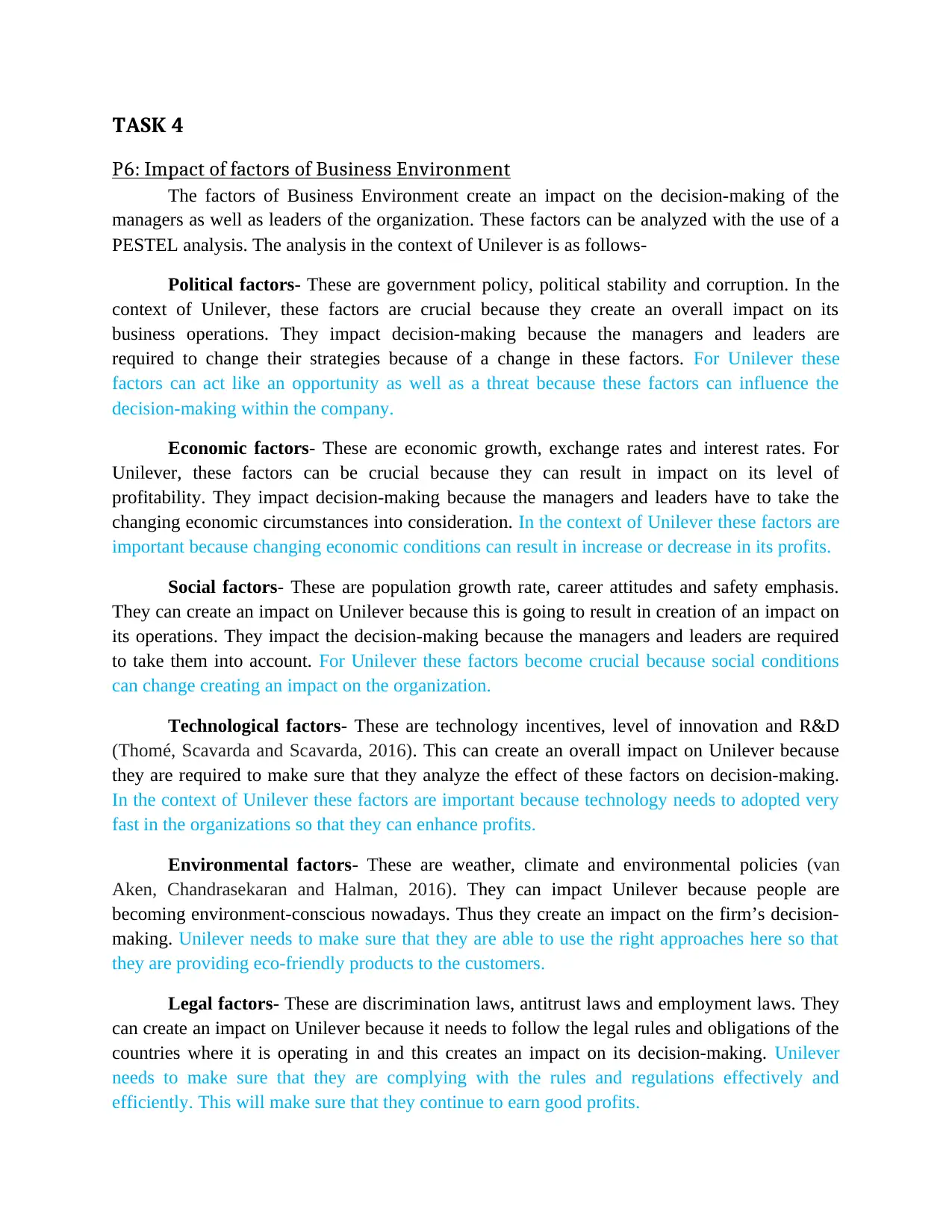
TASK 4
P6: Impact of factors of Business Environment
The factors of Business Environment create an impact on the decision-making of the
managers as well as leaders of the organization. These factors can be analyzed with the use of a
PESTEL analysis. The analysis in the context of Unilever is as follows-
Political factors- These are government policy, political stability and corruption. In the
context of Unilever, these factors are crucial because they create an overall impact on its
business operations. They impact decision-making because the managers and leaders are
required to change their strategies because of a change in these factors. For Unilever these
factors can act like an opportunity as well as a threat because these factors can influence the
decision-making within the company.
Economic factors- These are economic growth, exchange rates and interest rates. For
Unilever, these factors can be crucial because they can result in impact on its level of
profitability. They impact decision-making because the managers and leaders have to take the
changing economic circumstances into consideration. In the context of Unilever these factors are
important because changing economic conditions can result in increase or decrease in its profits.
Social factors- These are population growth rate, career attitudes and safety emphasis.
They can create an impact on Unilever because this is going to result in creation of an impact on
its operations. They impact the decision-making because the managers and leaders are required
to take them into account. For Unilever these factors become crucial because social conditions
can change creating an impact on the organization.
Technological factors- These are technology incentives, level of innovation and R&D
(Thomé, Scavarda and Scavarda, 2016). This can create an overall impact on Unilever because
they are required to make sure that they analyze the effect of these factors on decision-making.
In the context of Unilever these factors are important because technology needs to adopted very
fast in the organizations so that they can enhance profits.
Environmental factors- These are weather, climate and environmental policies (van
Aken, Chandrasekaran and Halman, 2016). They can impact Unilever because people are
becoming environment-conscious nowadays. Thus they create an impact on the firm’s decision-
making. Unilever needs to make sure that they are able to use the right approaches here so that
they are providing eco-friendly products to the customers.
Legal factors- These are discrimination laws, antitrust laws and employment laws. They
can create an impact on Unilever because it needs to follow the legal rules and obligations of the
countries where it is operating in and this creates an impact on its decision-making. Unilever
needs to make sure that they are complying with the rules and regulations effectively and
efficiently. This will make sure that they continue to earn good profits.
P6: Impact of factors of Business Environment
The factors of Business Environment create an impact on the decision-making of the
managers as well as leaders of the organization. These factors can be analyzed with the use of a
PESTEL analysis. The analysis in the context of Unilever is as follows-
Political factors- These are government policy, political stability and corruption. In the
context of Unilever, these factors are crucial because they create an overall impact on its
business operations. They impact decision-making because the managers and leaders are
required to change their strategies because of a change in these factors. For Unilever these
factors can act like an opportunity as well as a threat because these factors can influence the
decision-making within the company.
Economic factors- These are economic growth, exchange rates and interest rates. For
Unilever, these factors can be crucial because they can result in impact on its level of
profitability. They impact decision-making because the managers and leaders have to take the
changing economic circumstances into consideration. In the context of Unilever these factors are
important because changing economic conditions can result in increase or decrease in its profits.
Social factors- These are population growth rate, career attitudes and safety emphasis.
They can create an impact on Unilever because this is going to result in creation of an impact on
its operations. They impact the decision-making because the managers and leaders are required
to take them into account. For Unilever these factors become crucial because social conditions
can change creating an impact on the organization.
Technological factors- These are technology incentives, level of innovation and R&D
(Thomé, Scavarda and Scavarda, 2016). This can create an overall impact on Unilever because
they are required to make sure that they analyze the effect of these factors on decision-making.
In the context of Unilever these factors are important because technology needs to adopted very
fast in the organizations so that they can enhance profits.
Environmental factors- These are weather, climate and environmental policies (van
Aken, Chandrasekaran and Halman, 2016). They can impact Unilever because people are
becoming environment-conscious nowadays. Thus they create an impact on the firm’s decision-
making. Unilever needs to make sure that they are able to use the right approaches here so that
they are providing eco-friendly products to the customers.
Legal factors- These are discrimination laws, antitrust laws and employment laws. They
can create an impact on Unilever because it needs to follow the legal rules and obligations of the
countries where it is operating in and this creates an impact on its decision-making. Unilever
needs to make sure that they are complying with the rules and regulations effectively and
efficiently. This will make sure that they continue to earn good profits.
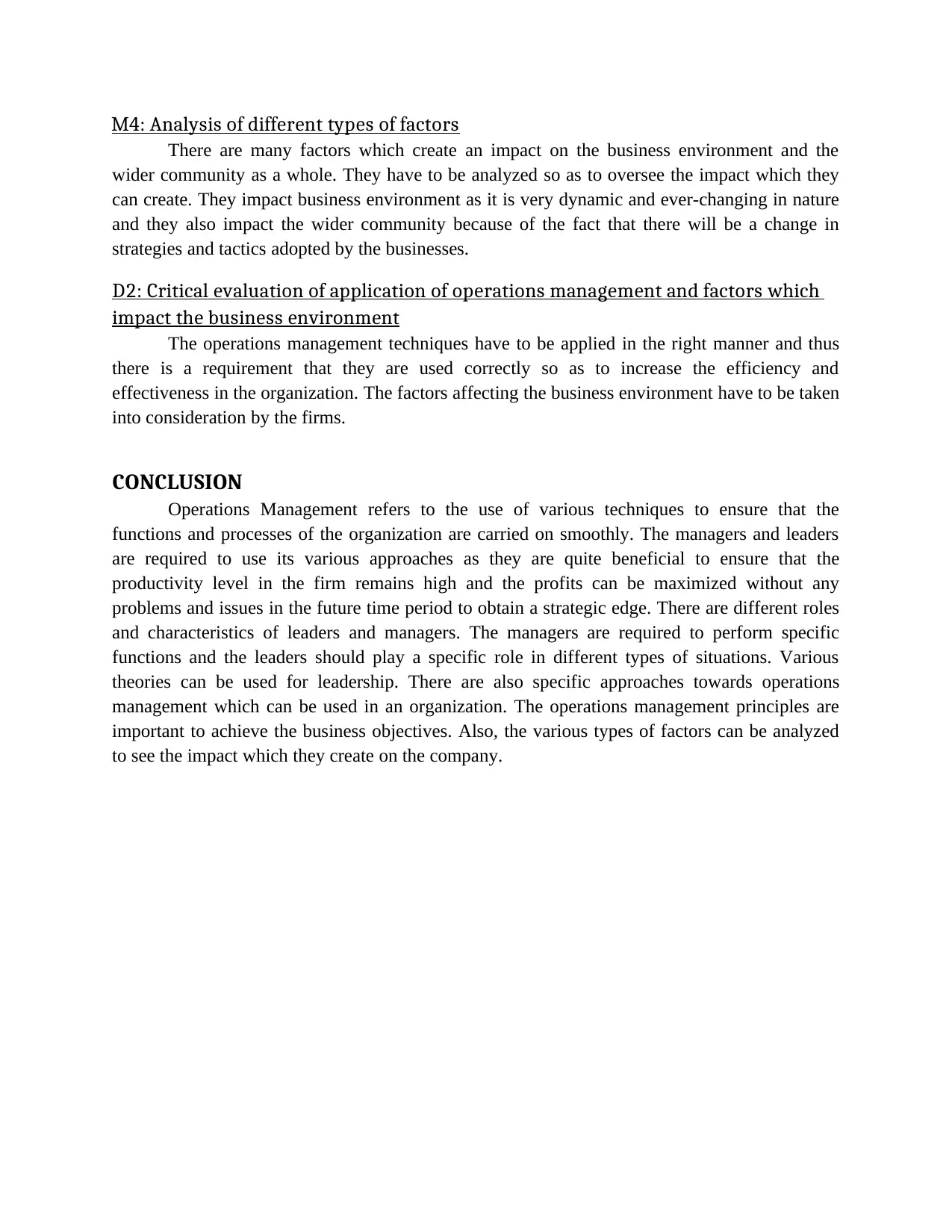
M4: Analysis of different types of factors
There are many factors which create an impact on the business environment and the
wider community as a whole. They have to be analyzed so as to oversee the impact which they
can create. They impact business environment as it is very dynamic and ever-changing in nature
and they also impact the wider community because of the fact that there will be a change in
strategies and tactics adopted by the businesses.
D2: Critical evaluation of application of operations management and factors which
impact the business environment
The operations management techniques have to be applied in the right manner and thus
there is a requirement that they are used correctly so as to increase the efficiency and
effectiveness in the organization. The factors affecting the business environment have to be taken
into consideration by the firms.
CONCLUSION
Operations Management refers to the use of various techniques to ensure that the
functions and processes of the organization are carried on smoothly. The managers and leaders
are required to use its various approaches as they are quite beneficial to ensure that the
productivity level in the firm remains high and the profits can be maximized without any
problems and issues in the future time period to obtain a strategic edge. There are different roles
and characteristics of leaders and managers. The managers are required to perform specific
functions and the leaders should play a specific role in different types of situations. Various
theories can be used for leadership. There are also specific approaches towards operations
management which can be used in an organization. The operations management principles are
important to achieve the business objectives. Also, the various types of factors can be analyzed
to see the impact which they create on the company.
There are many factors which create an impact on the business environment and the
wider community as a whole. They have to be analyzed so as to oversee the impact which they
can create. They impact business environment as it is very dynamic and ever-changing in nature
and they also impact the wider community because of the fact that there will be a change in
strategies and tactics adopted by the businesses.
D2: Critical evaluation of application of operations management and factors which
impact the business environment
The operations management techniques have to be applied in the right manner and thus
there is a requirement that they are used correctly so as to increase the efficiency and
effectiveness in the organization. The factors affecting the business environment have to be taken
into consideration by the firms.
CONCLUSION
Operations Management refers to the use of various techniques to ensure that the
functions and processes of the organization are carried on smoothly. The managers and leaders
are required to use its various approaches as they are quite beneficial to ensure that the
productivity level in the firm remains high and the profits can be maximized without any
problems and issues in the future time period to obtain a strategic edge. There are different roles
and characteristics of leaders and managers. The managers are required to perform specific
functions and the leaders should play a specific role in different types of situations. Various
theories can be used for leadership. There are also specific approaches towards operations
management which can be used in an organization. The operations management principles are
important to achieve the business objectives. Also, the various types of factors can be analyzed
to see the impact which they create on the company.
⊘ This is a preview!⊘
Do you want full access?
Subscribe today to unlock all pages.

Trusted by 1+ million students worldwide
1 out of 14
Related Documents
Your All-in-One AI-Powered Toolkit for Academic Success.
+13062052269
info@desklib.com
Available 24*7 on WhatsApp / Email
![[object Object]](/_next/static/media/star-bottom.7253800d.svg)
Unlock your academic potential
Copyright © 2020–2025 A2Z Services. All Rights Reserved. Developed and managed by ZUCOL.





